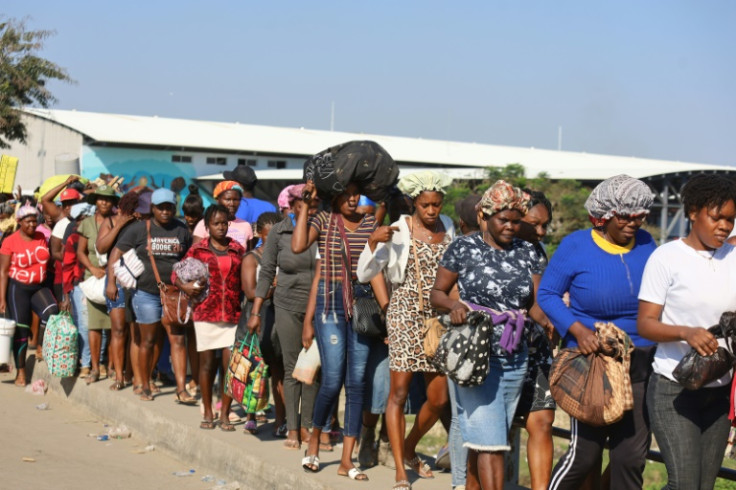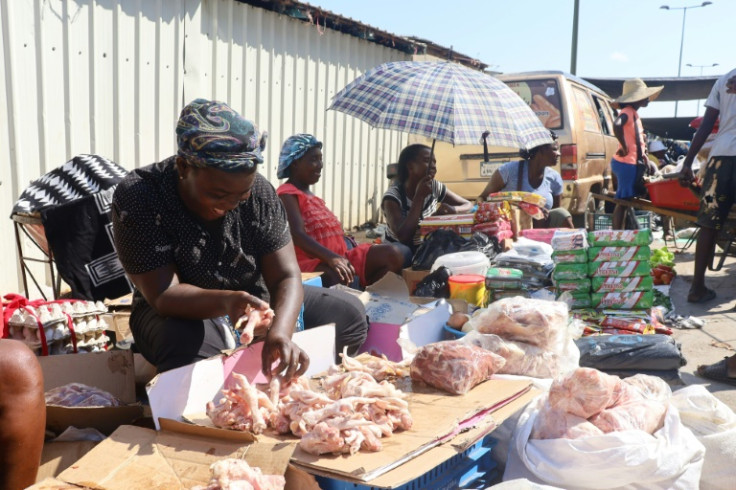Dominicans Try To Shield Busy Border Market From Haitian Chaos

Far from the violence ravaging Haiti, a market on the border with the Dominican Republic has managed to maintain a welcome degree of normal everyday life.
At the Dajabon border gate, a wave of Haitians press forward, eager to shop at the twice-weekly market, situated some 200 kilometers (120 miles) from Haitian capital Port-au-Prince.
They are drawn by the market's offerings -- food, clothing, toys, and even used appliances -- items not always readily available in Haiti.
But with gang violence bad and growing ever worse in Haiti, the Dominican government has reinforced the usual military presence at the border and placed soldiers on alert.
While the market continues to function, the authorities and merchants fear business may suffer as the gangs that control large swaths of Haiti make travel in the country risky, with travelers subject to being robbed or attacked.
"The market has seen a decline" in the last month, with customers "afraid to buy a large volume of merchandise" lest they be robbed on their way home, Noel Fernandez, president of a merchants' association, told AFP.
"The gangs there take the stuff," Fernandez said.
"But thanks to God, although we're not at 100 percent, the market is open," added the 36-year-old, a merchant in the area for much of his life.
The Haitian gangs have waged violent opposition to the government of Prime Minister Ariel Henry, demanding his ouster.
Haiti, the poorest country in Latin America, has not held elections since 2016. Henry has been in office since the 2021 assassination of President Jovenel Moise.
He was supposed to relinquish power to a successor in February, but reached a power-sharing agreement with the opposition to stay on until new elections are organized.
Riots demanding his ouster grew more intense in the past week, and the government extended a state of emergency after bandits attacked two prisons and freed thousands of inmates.
The government of the far more stable Dominican Republic next door has been building a 174-kilometer wall along the border with Haiti since 2022 in an effort to control migration from its desperate neighbor.
In Dajabon, hundreds of Haitians pass through the border gates on Mondays and Fridays, when passage to the binational market is free.
As part of their security measures, the Dominicans established separate corridors for men and women to enter. Guards use a biometric system to verify visitors' identities.
The additional security measures were implemented because of "the issue our neighboring country is currently experiencing," Morlin Fabian Tolentino, commander of a specialized border security unit, told AFP.
Dominican merchants said they feel safe and have suffered "no inconvenience."
"The security is good" because of the "rigorous" border controls, said 42-year-old merchant Juan Osoria.
People in Dajabon "are more concerned with trade" than any security challenge, added Mayor Santiago Riveron, even while confirming a drop in demand at the market as the Haitian crisis has grown worse.
Still, Haitians continue to walk through the colorful market, eyeing merchandise and pushing wheelbarrows or carrying baskets they hope to load up with merchandise.
Dominicans operating market stalls are happy to see that.
"Thank God it is happening," said 45-year-old Arcadio Ramirez, a fruit vendor. "It lets us make a living."


© Copyright AFP 2024. All rights reserved.





















